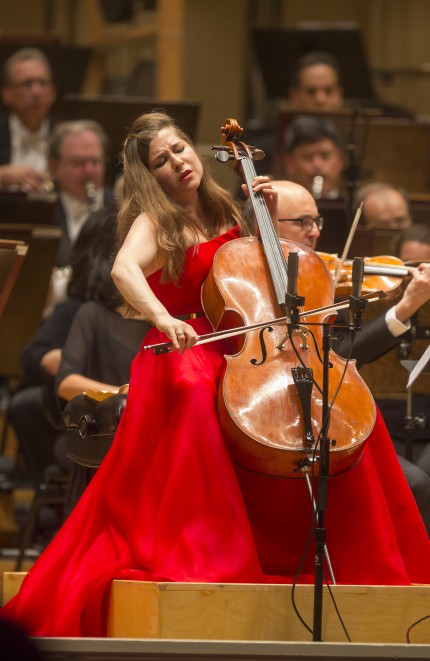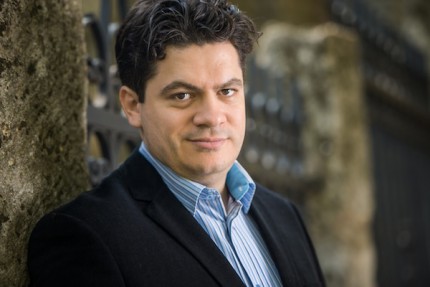Even with Weilerstein’s strong advocacy, static Dusapin premiere disappoints

By rights the 125th anniversary season of the Chicago Symphony Orchestra should have been celebrated with a bevy of works commissioned by several major international composers, befitting one of the world’s leading ensembles.
That didn’t happen–partly a result of the rigid musical conservatism of the orchestra’s present music director but also the fault of the previous CSO administration, which failed grievously in not planning a more worthy and adventurous celebration for this CSO season.
In fact, only one world premiere is taking place this anniversary season–Pascal Dusapin’s Outscape, commissioned by the CSO for soloist Alisa Weilerstein, who gave the cello concerto its debut Thursday night with Cristian Macelaru conducting.
The French composer says that he began the work with an Arctic inspiration, intrigued by the eccentric Glenn Gould’s short film, The Idea of North. Dusapin says he later abandoned the idea of calming Northern landscapes and “a desert of snow.” Instead, as stated in his rather inscrutable program note, the work turned more “indeterminate,” with the solo cello “becoming an orchestra” and the orchestra “becoming a cello.” Avoiding the genre’s usual oppositional drama, Dusapin says he instead wanted the musical force to “merge with the ‘otherness’” and his goal was to “guide them towards each other.”
Unfortunately, oppositional drama is precisely what is lacking in Outscape–a formless, meandering 28-minute dud that presents the outward elements of concerto form without any indelible thematic material or sufficient musical argument to grip and sustain the listener.
The original Arctic inspiration in palpable in Dusapin’s static style. The single-movement work begins with a low note from the soloist that is taken up by the bass clarinet and then piccolo. Long, held notes for the cello soloist and winds predominate, in an attempt, seemingly, to create a kind of concentrated Sibelian mystery. Yet the concerto suffers fatally from a lack of musical contrast and distinction, with Dusapin’s unvaried approach quickly turning dull and repetitive. There are breakout cadenzas and vigorous cello passages that feel disconnected from the musical argument, and seem to exist only to give the soloist some showy challenges. Dusapin tries to vary the grim austerity unconvincingly with trivialities from the large percussion battery—enough with the woodblocks already.
Weilerstein brought inspired advocacy to this uninspired music, performing with passion, a dizzyingly wide dynamic range, gleaming technique and consistently beautiful tone. She deserved a much better score. Macelaru led the orchestra in a well-prepared and skillful performance, and the very tall composer was on hand to share in the polite-to-enthusiastic applause.
One hoped for better things with The Planets, Gustav Holst’s remarkable, kaleidoscopic response to the seven heavenly bodies. (The English composer omitted Earth and Pluto had not yet been discovered in 1916 when the work was written).
Yet Thursday’s performance was a curiously uninvolved and uneven one. Scheduling such a large and complex work as The Planets on the same program as a substantial world premiere was a dangerous idea, and it’s hard not to feel that Holst’s large-scale work received insufficient rehearsal time to do it justice.
The humdrum opening of Mars lacked crucial tension yet Macelaru built the inexorable warlike tread into a truly terrifying climax of strident trumpets and malign, grinding ferocity. Jupiter went with apt hearty spirit and brassy swagger.
But too many of the other sections failed to come off. Macelaru has filled in capably for the CSO in the past, notably for the ailing Pierre Boulez. Yet his interpretive style seems weighted toward volume, and a heavy, unsubtle hand, lacking in nuance and finesse. For most of this performance, everything sounded too loud, at times jarringly so. Balances were also a sometime thing, with the organ glissando at the end of Uranus inaudible, buried by brass and percussion.
Undone by ill-tuned flutes and Macelaru’s metrical direction, Venus failed to provide the essential contrast with Mars of peaceful cooling balm. The quicksilver Mendelssohnian esprit of Mercury was sorely lacking in wit and charm. The pulsing flute notes of Saturn (“The Bringer of Old Age”) were loud and literal, completely missing the piercing pain that reflected the composer’s debilitating neuritis. Finally, while the offstage women of the CSO Chorus sang the difficult vocalise of Neptune with polish, the bland, unvaried mezzoforte of the orchestra completely failed to evoke the requisite sense of mystery and cosmic infinity.
The evening began with Ibert’s brassy Bacchanale, in its belated CSO debut. A late work, it proved as noisy and inconsequential as music of Ibert in his prime. Macelaru led a loud, lively performance, yet at ten minutes the work feels about seven minutes too long.
The program will be repeated 8 p.m. Saturday, 3 p.m. Sunday and 7:30 p.m. Tuesday. cso.org; 312-294-3000.
Posted in Uncategorized




Posted May 28, 2016 at 10:29 am by Frank Monnelly
This performance was my first encounter with Alisa Weilerstein live, rather than a recording. Ms. Weilerstein has that, for me, tone setting her apart from other cellists. As to the piece she performed, I have not formulated an opinion.
Posted May 28, 2016 at 4:31 pm by william schorsch
Those who con’t, critique. I was at Friday’s matinee and enjoyed it immensely, especially The Planets. It seems to me the CSO often balances programs with new music with well-known classics, which I believe is a great way to bring new music to the patrons.
Posted May 30, 2016 at 6:36 pm by Charles Amenta III
I think that I have to go with Mr. Johnson on this one. It’s an unusual year in that I heard two world premiere cello concertos. For this second, the Dusapin, I expected a lot out of and it seemed very limited. It’s in c-sharp minor and when I say c-sharp minor, I really mean c-sharp minor. The cello line which is is slow and sustained with various swells on notes (usually c-sharp) goes up a minor third to e or up a minor third from a sharp to c sharp. And there’s a small bit of decorative stuff in the orchestra and sometimes the soloist does the rapid skittering stuff while the orchestra plays the notes in the c-sharp minor scale, and on rare occasions after about 90% of the piece, they skitter together. But this is really too static to even be some sort of elegy.
Three further comments on this. I once told a friend that I would pay to hear Daniel Barenboim play a C-major scale. Ms. Weilerstein is my favorite cellist, and despite my disappointment, I would pay to hear her play a C-sharp minor scale. She’s wonderful! They say in jazz that the performance is always better than the piece. I think that held here. The opening effect was the best with her swelling on the note was matched by the bass clarinet. (But in Classical, we expect the piece to be greater than any possible performance.)
Finally, I thought that I would not find myself saying I wished that a premiere would be more like Xenakis, Boulez, or Carter–but this was too easy. It’s better to say “I’m confused” about a piece but feel interested enough to come back to it than at the first hearing think, “I’ve got this” (i.e., no need for any more listening).
The other cello concerto was by Joshua Roman (full disclosure, I’m on the Board of the Illinois Philharmonic Orchestra, which gave the premiere). I thought his piece exceeded expectations for someone writing his first orchestral work. It was a bit eclectic–lots of Vaughn-Williams modal with a Silk Road section passing to further modal stuff to minimalist gestures and then a bluesy ending. But it was fun and had the cello doing a lot more interesting things than it did in “Outscapes.”
Posted Jun 01, 2016 at 6:06 pm by lynne lasser
the dusapin premiere was probably the longest 28 minutes of my life. I couldnt wait for it to end. I thought The Planets fared better. I hate it when CSO programs oddball contemporary music with favorites; it’s like theyre trying to ram it down our throats with a spoonful of sugar. doesnt work for me.
Posted Jun 03, 2016 at 9:24 am by Tod Verklärung
It would appear that Ms. Lasser has led a blessed life if Dusapin produced such a profound effect. I would remind her, however, that “The Planets” was also once a contemporary work, as was another classic, the riot-producing “Rite of Spring.” It is the responsibility of any culturally relevant arts organization to have one foot in the present, as well as one in the past.